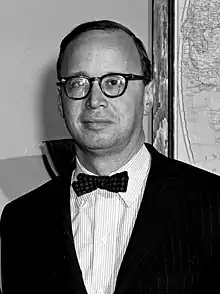Arthur M. Schlesinger Jr.
Arthur Meier Schlesinger, Jr., nacido como Arthur Bancroft Schlesinger (Columbus, Ohio, 15 de octubre de 1917-Manhattan, Nueva York, 28 de febrero de 2007), fue un historiador y crítico social estadounidense. Fue galardonado con el Premio Pulitzer. Su trabajo exploró el liberalismo de los líderes políticos de su país, especialmente Franklin D. Roosevelt, John F. Kennedy y Robert F. Kennedy.
| Arthur M. Schlesinger Jr. | ||
|---|---|---|
 Schlesinger en 1961 | ||
| Información personal | ||
| Nombre de nacimiento | Arthur Bancroft Schlesinger | |
| Nacimiento |
15 de octubre de 1917 Columbus (Estados Unidos) | |
| Fallecimiento |
28 de febrero de 2007 (89 años) Nueva York (Estados Unidos) | |
| Causa de muerte | Infarto agudo de miocardio | |
| Sepultura | Cementerio Monte Auburn | |
| Residencia | Nueva York | |
| Nacionalidad | Estadounidense | |
| Familia | ||
| Padres |
Arthur M. Schlesinger Sr. Elizabeth Bancroft Schlesinger | |
| Cónyuge | Marian Cannon Schlesinger (1940-1970) | |
| Educación | ||
| Educado en | ||
| Información profesional | ||
| Ocupación | Historiador y profesor universitario | |
| Empleador | ||
| Géneros | crítica, historia. | |
| Partido político | Partido Demócrata | |
| Miembro de | ||
| Distinciones |
| |
Carrera
Es hijo de Arthur M. Schlesinger, Sr., quien fuera un reconocido historiador social de la Universidad Estatal de Ohio y de la Universidad de Harvard.
Estudió en la Phillips Exeter Academy en Nuevo Hampshire y recibió su primer título a la edad de veinte años en Harvard, donde se graduó summa cum laude.
Trabajó como Asistente Especial e historiador de la Corte del Presidente de los Estados Unidos, durante el gobierno de John Kennedy. Escribió un libro sobre esta experiencia, titulado A Thousand Days.
Se opuso al plan de invasión de Cuba, cuyo primer movimiento sería invasión de bahía de Cochinos, cuando tuvo conocimiento de él en febrero de 1961,[1] sugiriendo que se incitara a Castro a llevar a cabo una operación negra en Haití que serviría de excusa para el ataque a Cuba.[2]
Schlesinger contribuyó con varios aportes a la teoría liberal. Se lo recuerda por su trabajo, enseñanza y devoción en delinear la historia y naturaleza del liberalismo. Desde 1990 fue un crítico del multiculturalismo.
Popularizó la frase «presidencia imperial» durante el gobierno de Nixon al escribir el libro The Imperial Presidency.
Obras
- 1939 Orestes A. Brownson: A Pilgrim's Progress
- 1945 The Age of Jackson
- 1949 The Vital Center: The Politics of Freedom
- 1950 What About Communism?
- 1951 The General and the President, and the Future of American Foreign Policy
- 1957 The Crisis of the Old Order: 1919-1933 (The Age of Roosevelt, Vol. I)
- 1958 The Coming of the New Deal: 1933-1935 (The Age of Roosevelt, Vol. II)
- 1960 The Politics of Upheaval: 1935-1936 (The Age of Roosevelt, Vol. III)
- 1960 Kennedy or Nixon: Does It Make Any Difference?
- 1963 The Politics of Hope
- 1963 Paths of American Thought (ed. con Morton White)
- 1965 A Thousand Days: John F. Kennedy in the White House
- 1965 The MacArthur Controversy and American Foreign Policy
- 1967 Bitter Heritage: Vietnam and American Democracy, 1941-1966
- 1967 Congress and the Presidency: Their Role in Modern Times
- 1968 Violence: America in the Sixties
- 1969 The Crisis of Confidence: Ideas, Power, and Violence in America
- 1970 The Origins of the Cold War
- 1973 The Imperial Presidency
- 1978 Robert Kennedy and His Times
- 1983 Creativity in Statecraft
- 1986 Cycles of American History
- 1988 JFK Remembered
- 1988 War and the Constitution: Abraham Lincoln and Franklin D. Roosevelt
- 1990 Is the Cold War Over?
- 1991 The Disuniting of America: Reflections on a Multicultural Society
- 2000 A Life in the 20th Century, Innocent Beginnings, 1917-1950
- 2004 War and the American Presidency
- 2007 Journals 1952-2000
Premios
- 1946 Premio Pulitzer en Historia por The Age of Jackson
- 1958 Premio Bancroft por The Crisis of the Old Order
- 1958 Premio Francis Parkman por The Crisis of the Old Order
- 1965 National Book Award por A Thousand Days
- 1966 Premio Pulitzer por Biografía por A Thousand Days
- 1979 National Book Award por Robert Kennedy and His Times
- 1998 National Humanities Medal
- 2003 Four Freedoms Award
- 2006 Premio Paul Peck
- 2006 Medalla Niebuhr
Referencias
- A Thousand Days: John F. Kennedy in the White House, Arthur M. Schlesinger Jr.
- «Cuba, 1961–1962». Foreign Relations of the United States 1961–1963. United States Department of State. 1997.